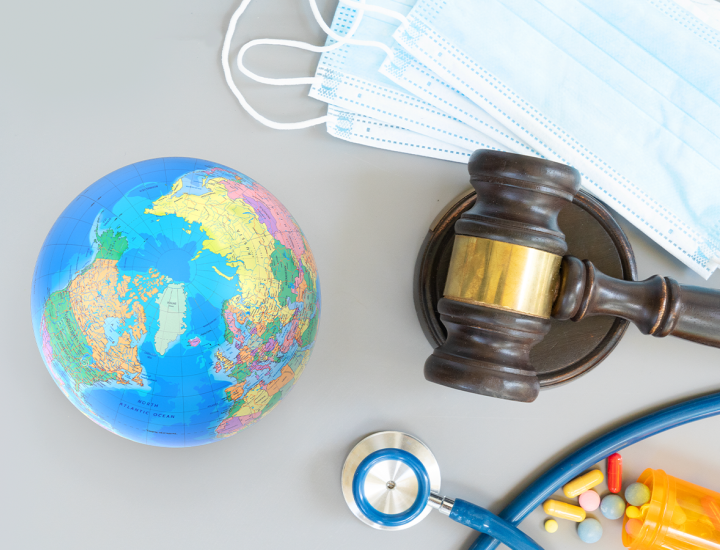
Global health crises, such as the COVID-19 pandemic, represent significant challenges faced by countries and contemporary societies. Addressing these crises may require exceptional measures that interfere with the rights and freedoms of individuals. In this context, it becomes crucial to understand the legal limits of these measures and how to strike a balance between protecting public health and preserving individual rights. National and international laws governing the handling of health crises are diverse, but challenges intensify when these laws intersect with human rights and national interests.
1. Individual Rights in Global Health Crises
International legislation seeks to protect human rights even during difficult times, including in global health crises. Among the rights that must be considered are the individual's right to life, health, and personal liberty. However, some restrictions on these rights may be imposed in the context of global health crises, such as quarantine, isolation, and other preventive measures.
Although these measures are necessary to protect public health, international legislation sets specific controls to ensure that these actions are not arbitrary or excessive. For example, according to international agreements like the International Covenant on Civil and Political Rights, any restrictions on personal freedoms must be proportionate to the level of threat posed by the health crisis.
Practical Example: During the pandemic, mandatory quarantine measures were implemented, but they were based on scientific assessments to evaluate the level of danger and ensure that individual freedoms were not unduly compromised.
2. The Legal Role of States in Health Crises
States play a key role in formulating policies and measures that protect the health of citizens and reduce the spread of epidemics. At the same time, states must act within the framework of international law and respect individual rights when addressing health crises. Measures taken by states may include imposing lockdowns, restricting movement, and regulating the distribution of health resources—actions that raise questions about balancing individual rights with public health needs.
In this context, international organizations like the World Health Organization contribute by providing guidelines that countries must follow. These guidelines ensure that health responses are evidence-based and focus on protecting citizens' health without infringing on their fundamental rights.
Political Challenge: Despite the importance of these guidelines, some countries may adopt responses that differ from the recommended ones due to political or economic reasons, which may lead to tensions in managing health crises.
3. Legal Challenges in Implementing Health Measures
One of the greatest legal challenges faced by countries in global health crises lies in implementing health measures in a fair and equitable manner. Vulnerable social groups, such as the poor, ethnic minorities, and the elderly, may be disproportionately affected by these measures. Therefore, legal frameworks need to ensure that health policies are inclusive and do not exacerbate inequality.
Furthermore, some health measures may conflict with individuals' economic and social rights, such as the right to work and freedom of movement. For example: workers in jobs that cannot be performed remotely may face difficulties in maintaining their livelihoods during lockdowns.
Therefore, legal frameworks must strike a balance between protecting public health and ensuring the continuation of economic and social life, while finding innovative solutions to support individuals' rights during crises.
4. Legal Challenges at the International Level
In global health crises, measures are not confined to the national level alone; countries must work together at the international level to tackle shared health challenges. The COVID-19 pandemic highlighted the importance of international coordination for vaccine distribution, information sharing, and providing financial support to poorer countries.
Political and Economic Challenge: In these contexts, international coordination may be hindered by political or economic differences between countries. Some countries may prioritize their own economic interests over international cooperation, which could delay crucial decisions and exacerbate the crisis.
5. The Role of the United Nations in Addressing Global Health Crises
The United Nations plays a central role in guiding global efforts to combat health crises through its specialized agencies, such as the World Health Organization (WHO). The UN provides financial and technical support to countries, helping coordinate governments to ensure a unified and effective response. In addition, the UN advocates for the protection of human rights during health crises, emphasizing that health measures should align with international human rights standards.
UN Challenge: Despite the UN's proper guidance, international coordination may face many obstacles, such as international politics and economic pressures, which can hinder the swift and effective implementation of measures.
6. Legal Safeguards in Times of Health Crises
Although health measures may require temporary limitations on some individual rights, there must be legal safeguards to protect individuals from abuse. These safeguards include:
Judicial Review: There must be legal mechanisms for reviewing health measures to ensure they comply with international legal standards.
Transparency: Health crisis measures should be clear and transparent so that citizens can understand what is happening and why.
Compensation: If health measures disproportionately affect individual rights, mechanisms should be in place to compensate those affected.
Dealing with global health crises raises numerous legal questions about the limits of health measures that states can impose. It requires achieving a delicate balance between protecting public health and ensuring that fundamental individual rights are not violated. Through national and international laws that respect human rights and achieve justice, health crises can be addressed effectively without compromising core legal values.
No comments yet, your opinion matters!
Be the first to share your thoughts and kickstart the conversation. We can’t wait to hear what you think!